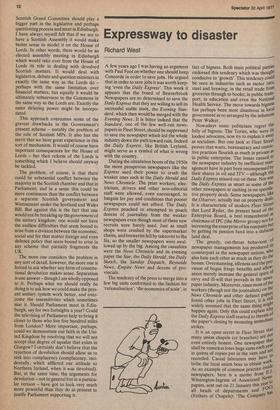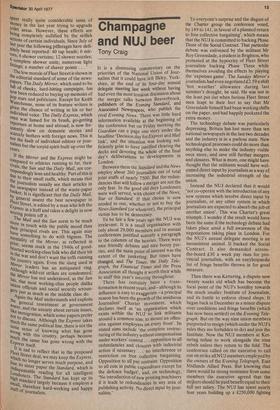Expressway to disaster
Richard West
A few years ago I was having an argument with Paul Foot on whether one should keep Concorde in order to save jobs. He argued that in order to save jobs it was worth keeping 'even the Daily Express'. This week it appears that the board of Beaverbrook Newspapers are so determined to save the Daily Express that they are willing to sell its successful stable mate, the Evening Standard, which then would be merged with the Evening News. It is bitter indeed that the Standard, one of the few well-run newspapers in Fleet Street, should be suppressed to save the newspaper which led the whole industry down the path toward ruink. Indeed the Daily Express, like British Leyland, might serve as a symbol of what is wrong with the country.
During the circulation boom of the 1950s the more prosperous newspapers like the Express used their power to crush the weaker ones such as the Daily Herald and News Chronicle. The print workers, electricians, drivers and other non-editorial staff were allowed, even encouraged, to bargain for pay and conditions that poorer newspapers could not afford. The Daily Express poached or attempted to poach dozens of journalists from the weaker newspapers even though most of these new recruits were barely used. Just as small shops were crushed by the supermarket chains, and breweries fell by takeover to the Six, so the smaller newspapers were swallowed up by the big. Among the casualties were the News Chronicle and its evening paper the Star, the Daily Herald, the Daily Sketch, the Sunday Dispatch, Reynolds News, Empire News and dozens of provincials.
The tendency of the press to merge into a few big units conformed to the fashion for 'rationalisation', 'the economics of scale', in
fact of bigness. Both main political parties endorsed this tendency which was thought conducive to 'growth'. This tendency could be seen in industries such as motor cars, steel and brewing; in the retail trade from groceries through to books; in public transport, in education and even the National Health Service. The move towards bigness has perhaps been most disastrous in local government as re-arranged by the infamous Peter Walker.
Nowadays some politicians regret the folly of bigness. The Tories, who were its loudest advocates, now try to explain it away as socialism. But one look at Fleet Street proves that waste, bureaucracy and restrictive practices flourish as much in private as in public enterprise. The losses caused to the newspaper industry by inefficient management have in part been recompensed bY their shares in oil and ITV — although the Daily Express missed out on these. Nor was the Daily Express as smart as some of the other newspapers at cashing in on specul ,,ative property deals. Some newspapers, the Observer, actually lost on property dealS' It is characteristic of modern Fleet Street that Lord Ryder, the present head of the Enterprise Board, is best remembered as chairman of I PC (the Mirror group) not for increasing the enterprise of his comparlY but by getting its pension fund into a dubious land deal. The greedy, cut-throat behaviour of newspaper managements has produced its counterpart in the newspaper unions, wb° also hate each other as much as they do the bosses. Overmanning, idleness and the 1'Ovision of bogus fringe benefits and allowi ances merely increase the general spirit ° envy and that prevails in the newspaper industry. Moreover, since most of die workers (though not the journalists) on the News Chronicle and other defunct paPers.,1 found other jobs in Fleet Street, it is stilt widely assumed that the same thing trig!' happen again. Only this could explain woYf the Daily Express staff reacted to threats o the paper's closing by mounting immediate
strikes. hat
It is an open secret in Fleet Street t t many union chapels (or branches) are Irt even entirely honest. One newspaper tit shall be nameless loses huge sums each Ye,s't
in quires of copies put in the vans and v
nto
recorded. Casual labourers may have
bribe the local union boss to obtain wo.1Te As an example of common practice irtr J. newspapers, here is a memo from ws, Winnington-Ingram of Associated Ne to papers, sent out on 21 January this yeat,cs all heads of departments and FU,, (Fathers of Chapels): 'The CompanY Spent really quite considerable sums of Money in the last year trying to upgrade toilet areas. However, these efforts are being completely nullified by the selfish actions of certain individuals. Since July of last year the following pilferages have definitelY been reported: 40 tap heads; 6 mirrors; 6 shower curtains; 12 shower nozzles; 6 complete shower units; numerous light fittings; a number of shaver points . . . The low morale of Fleet Street is shown in the editorial standard of some of the newsPapers. The Daily Mirror, which used to be frill of cheeky, hard-hitting campaigns, has now been reduced to buying up memoirs of Poi) stars and politicians. Except for Keith Waterhouse, none of its feature writers is given the chance of writing in his or her individual voice. The Daily Express, which once was famed for its brash, go-getting reporters at home and abroad, is now frequently slow on domestic stories and scarcely bothers with foreign news. This is not the fault of individual editors or journalists but the torpid spirit built up over the Years.
If the Mirror and the Express might be enrnPared to athletes running to fat, their rivals, the Sun and the Daily Mail, are correspondingly lean and healthy. Part of this is re to their small staffs, which means that 'tire journalists usually see their articles in bhe newspaper instead of the waste-paper basket. It is significant that the Daily Mail, F); general assent the best newspaper in eet Street, is edited by a man who left the 'xIoress in a huff and takes a delight in now se(Iring points off it.
The Mail and the Sun seem to be much rntbore in touch with the public mood than
eh' principal rivals are. This again may "aye something to do with bigness. The onletnnttality of the Mirror, as reflected in seems stuck in the 1940s of good. carted working-class folk who did their bit I.Ti! the war and don't want the toffs running country again. Even the slang used in M. !rror leaders has an antiquated ring. ;;;Ithough wild-cat strikes are condemned, Mirror has not understood, as the Sun ,7s, that most working-class people dislike "Rion officials and social security scroungers just as much as the middle class do. thAgain the Mail understands and exploits w e general resentment at government iii.aste, and the anxiety about certain issues, immigration, which some papers prefer _not to discuss. Although the Express takes ..111_11eb the same political line, there is not the w'an'ie sense of knowing what has gone 2300 with this country, perhaps because
Lich the same has gone wrong with the express itself.
vi It is sad to reflect that in the proposed w _ .eet Street deal, we may keep the Express, lose no longer serves much purpose, and io_e, its sister paper the Standard, which is TnalsPensable reading for all intelligent t-Ogridoners. The Standard has kept up its b standard largely because it employs a sinall, therefore hard-working and happy taff of journalists.



































 Previous page
Previous page